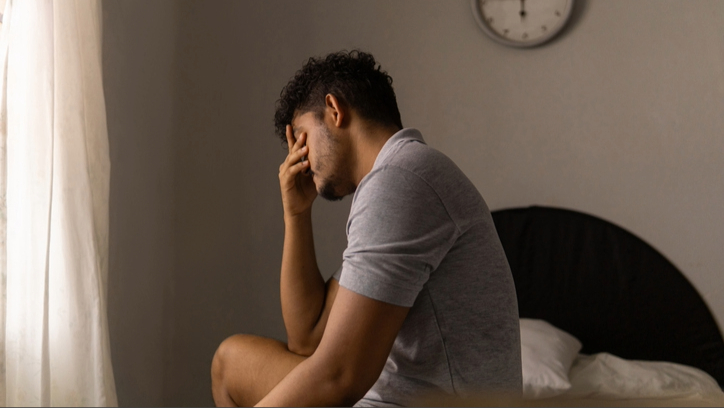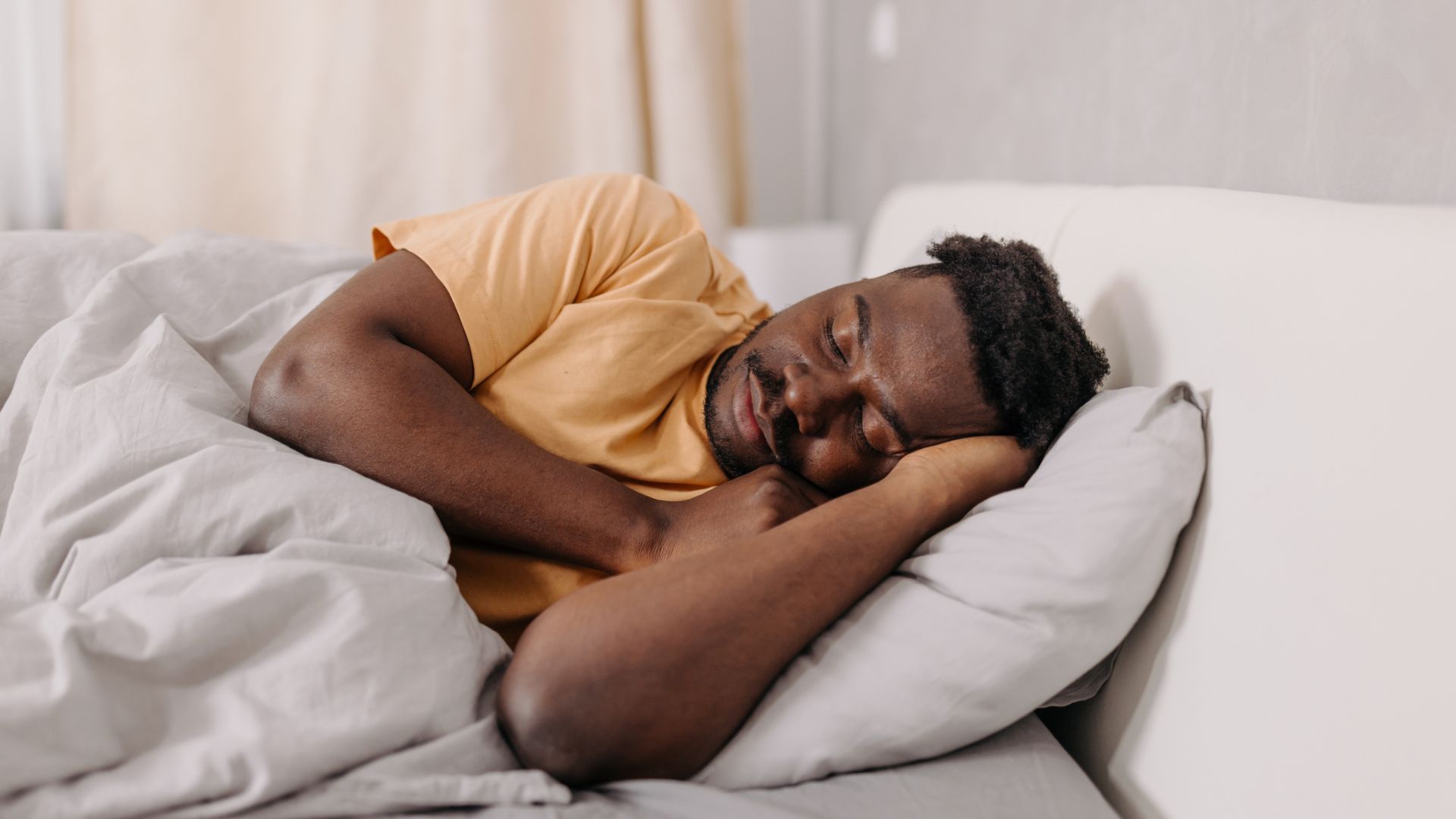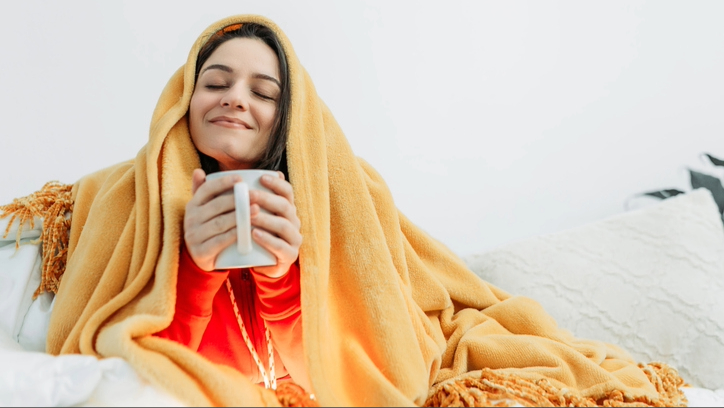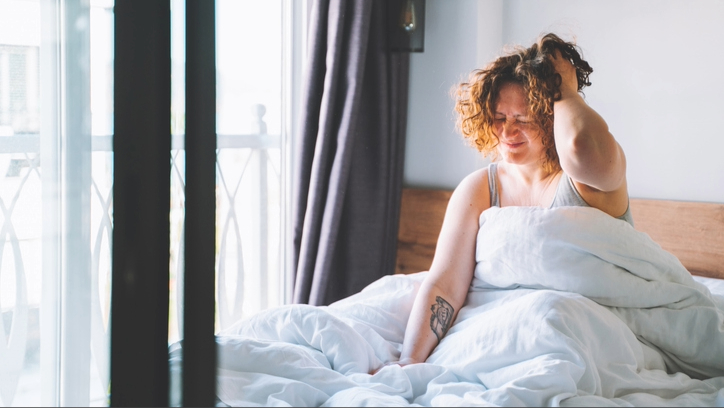3 reasons you're waking up every hour at night — and how to stop it
Stress and screentime are big culprits of nighttime awakenings

If you're anything like me, you'll often find yourself waking up every couple of hours, or worse, every hour during the night for no apparent reason. You don't need the toilet, you're not running hot or being disturbed by any sound. You're just awake. And even when you eventually drop off, the same things happen the next hour.
Even if you're sleeping comfortably on the best mattress for your sleep style in a cozy and calm bedroom, these nighttime awakenings can still happen — there's a lot that goes into getting good sleep, after all. I've been sleeping on a leading smart bed that regulates my temperature through the night, and I'm still waking up. Admittedly, I've let my bedtime routine slip lately as festivities have picked up, so I'm putting my nighttime awakenings down to this.
But what else causes this? Here, we're talking a closer look at the different reasons why you might be waking up hourly during the night to help you pinpoint the problem and find a solution to your fragmented sleep.
3 reasons you're waking up every hour at night
It’s common to wake up throughout the night because we naturally wake at the end of our 90-minute sleep cycles. For most people, these wake-ups are so brief they won't even notice they've woken before falling back asleep. Some sleep experts suggest waking up at night was a normal sleep habit of our ancestors. But if you’re waking up every hour staring at the ceiling, these could be the reasons.

1. Stress
Research shows your sleep quality and quantity can deteriorate when you're stressed, especially if you have a highly reactive sleep system. Stress is a major contributing factor to insomnia and one that can cause recurrent nighttime awakenings due in part to elevations in blood pressure.
When you have a lot of stressors on your mind, you may also find yourself waking up worrying about what you have to tick off your to-do list the following day or about things that happened the day before. This means your mind doesn't fully switch off at night and you're more prone to waking up.
2. Screentime
We're well versed in how blue light from screens makes it harder to fall asleep. But what isn't spoken about as much is how it can continue to disrupt your sleep through the night. The light emitted from a phone, TV or tablet screen overstimulates your nervous system, making it harder to peacefully move through sleep cycles.
Sign up to get the BEST of Tom's Guide direct to your inbox.
Get instant access to breaking news, the hottest reviews, great deals and helpful tips.
When you wake up at night it can be tempting to check your phone, even just to see what time it is, and this light cue confuses the circadian rhythm as your body will think it is time to wake up.
You will then feel more awake, making it harder to get back to sleep and increasing your chances of waking up again. Additionally, having your phone close by your bed, lighting up with notifications through the night can interrupt your sleep due to low-level humming or light emission.
3. Temperature
Climate can also play a role in nighttime disturbances. In winter, temperatures can gradually fall overnight, which may cause you to wake up when you're reaching for an extra blanket.
The opposite may be true if you are covered with a heavy blanket and make a habit of kicking it off every night. Hence, temperature balance can be tricky to get right, but understanding your sleep style can help.
We recommend hot sleepers invest in a cooling mattress to make sure they don't wake up with night sweats. Meanwhile nighttime shiverers will want some warm, cosy bedding.
5 ways to sleep through the night
Whatever the reason you're waking up every hour at night, there are ways you can help yourself get better sleep. From a consistent sleep schedule to better sleep hygiene, these science-backed tips can help you sleep soundly through the night.

1. Craft a sustainable sleep routine
We all dream of a sleep schedule where we fall asleep like clockwork night after night. You can achieve this by regulating your circadian rhythm. Crafting an effective nighttime routine that you can follow each night before bed will help your body recognise that it is time to wind down for bed. As such, it will produce more of the sleepy hormone melatonin to help you drift off and get consistent quality sleep.
Your bedtime routine should be personal, but we recommend including steps like reducing light and screen exposure, reading or listening to calming music like binaural beats. One of the Tom's Guide team swears by this 4-step nighttime routine to ease anxiety.
2. Get enough daylight
Getting enough daylight is a great way to regulate your circadian rhythm. It is especially important to get daylight early in the morning as it helps you feel energized for the day ahead and naturally sleepy in the evenings.
Making sure you expose yourself to ample daylight during the day and settle down in a dark environment at night helps train your body to know when it is time to be alert and when it is time to rest. Naturally, you will sleep better at night when your internal clock knows what it should be doing.
3. Avoid big meals and sugary snacks before bed
Eating before bed can make it harder to fall asleep and stay asleep. Your body is still working to convert food into energy, which can disrupt your circadian rhythm. It can also cause gastrointestinal discomfort in the form of indigestion, heartburn or acid reflux, which can wake you up.
Similarly, sugary snack prompt spikes and drops in blood sugar levels, triggering irregular sleep patterns. Researchers say this blood sugar fluctuation causes increased feelings of hunger and thirst that may wake you up and disrupt your sleep.
4. Perfect your sleep space
To get the best rest, your bedroom needs to be conducive to sleep. First, equip your bed with a quality mattress suited to your sleep needs and comfortable bedding. Make sure you have the best pillow for your sleeping position so your neck and back aren't strained.
Then, you can add ambience with light and calming sounds. I recommend picking up one of this year's best sunrise alarm clocks as their wind down features simulate a sunset in your bedroom, blissfully sending you to sleep.

It's also important to be disciplined about how much time you spend in bed before actually going to sleep. It can be tempting to lounge around earlier at this time of year, but this can savage your sleep quality as it makes it harder for you to switch off when it is time to sleep. Unsurprisingly, working in bed is a big no!
5. Be mindful of alcohol and stimulants
Although booze can make you drowsy and drop off fast, alcohol reduces the quality of your sleep leading to more frequent awakenings throughout the night. Your body needs time to metabolize alcohol before it can properly rest. Plus binge drinking derails your sleep entirely, not just on the night you drink, but for several nights after when you're more likely to suffer from disjointed sleep.
Similarly, it will come as no surprise that stimulants like caffeine can disrupt your sleep at night. Making you more hyper-alert, caffeine can cause you to wake up frequently at night. That's why sleep experts recommend cutting off your coffee intake in the afternoon or close to your bedtime.

Still struggling to sleep through the night?
If all fails and you're still getting disrupted sleep, you might be experiencing insomnia. Medical advice says you may be diagnosed with insomnia if you have difficulty falling or staying sleep at least three nights a week. If this is you, and not getting enough sleep is affecting your daily activities, it's a good idea to seek professional help from your doctor.

Eve is a PPA-accredited journalist with an MA in Magazine Journalism from Cardiff University. She is a Sleep Staff Writer at Tom’s Guide and has four years’ experience writing health features and news. She is particularly interested in the relationship between good sleep and overall health. At Tom’s Guide Eve is responsible for coverage and reviews of sleep tech and is our smart and cooling mattress specialist, focussing on brands such as Eight Sleep and Sleep Number. She also covers general mattress reviews, seeks out the best deals to produce tried-and-tested buyer's guides for sleep accessories and enjoys writing in-depth features about sleep health. She has been involved in rigorous testing procedures for mattress reviews in our Sleep Studio and has interviewed experts including sleep doctors and psychologists. When not covering sleep at Tom's Guide, Eve enjoys writing about health and fitness, food and culture.
